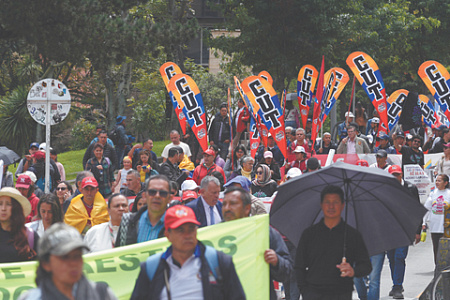
Colombian President Gustavo Petro was able to get the approval of labor law reform in the country’s Congress only on the third attempt. He had to threaten the deputies with holding a nationwide referendum on the reform and even issue a corresponding decree. But the president’s confrontation with the opposition will not end there. The results of the popularly supported reform may turn against the Colombian president, only exacerbating the scale of unemployment and other social problems. This will give Petro’s opponents the opportunity to curtail his social transformations or at least prevent new changes, which, as the local right fears, are leading the country along the Venezuelan path.
In 2022, Colombia’s political pendulum suddenly swung to the left. Gustavo Petro, a former Marxist rebel, became president of the country, declaring a course towards socio-economic reforms. They were designed to reduce the gap between rich and poor, improve social security and, in principle, raise the standard of living of the population. Society is waiting for transformations: there are many poor people in Colombia, drug trafficking and organized crime are flourishing. In addition, since the beginning of the year, the Government’s relations with the National Liberation Army, the last major rebel group, have been straining. It is assumed that improving public well-being should at least partially solve this problem, allowing the rebels to abandon the armed struggle and fit into a peaceful life with social guarantees.
At the same time, local right-wingers and former Petro supporters who joined the opposition predictably began to hinder the reforms that the new president is seeking to implement. In his plans, Colombian politicians see the threat of a repeat of Hugo Chavez’s reforms. They fear that Petro, having fulfilled his election promise to restore diplomatic and trade relations with Venezuela, may repeat the Venezuelan experience of building “Bolivarian socialism”, with all its disadvantages.
The confrontation between the two factions in the Colombian Congress escalated when opponents of Petro’s reforms won the regional elections in the largest cities. The right-wing forces in parliament began to block the projects proposed by the presidential administration even more actively. The opposition did not allow the implementation of healthcare reform. And in June 2024, the head of state had a hard time getting the pension reform approved, calling it “the main social achievement for the working people of Colombia for a long time.”
And so Petro won another victory – on June 17, the Senate (the upper house of parliament) passed a bill on labor, which was rejected twice. To do this, however, it was necessary to sign a decree according to which the initiative was put to a national vote. The bill provides, in particular, for the introduction of an eight-hour day working day, as well as an increase in wages on weekends and holidays. It would seem that all this should guarantee an improvement in the quality of life of the population, but in the case of Colombia, everything is not so simple. According to the Associated Press, 56% of Colombian workers are employed without a contract. In such circumstances, the adoption of the bill can only increase the number of unemployed in the country, as official employment will become extremely unprofitable for employers. According to Reuters calculations, the increase in labor costs will range from 6.8% to 35%.
If changes in labor legislation do lead to a deterioration in socio-economic indicators, the opposition will have even more reasons to block any reforms of the Petro. The president’s position is aggravated by his own managerial decisions. Former Education Minister Alejandro Gaviria said Petro had lost support in Congress, particularly because he had replaced most moderate members of his cabinet with followers of radical leftist ideology.
In an interview with NG, Zbigniew Ivanovsky, chief researcher at the Institute of Latin America of the Russian Academy of Sciences, noted that the contradictions between the Congress and the President of Colombia are really serious and they are growing. “Petro initially did not have a parliamentary majority. He was able to form a coalition of very different parties and gain a relative majority, but immediately after that, a government crisis began. As a result of several government reorganizations, the ruling coalition has practically collapsed. This situation significantly complicates Petro’s relations with Congress, making them very explosive,” the expert said.
